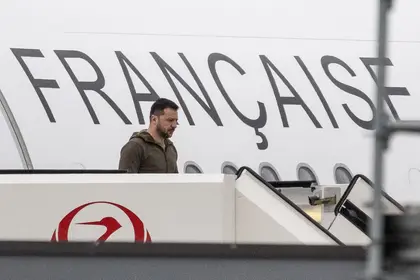Ukrainian President Volodymyr Zelensky arrived in Hiroshima on Saturday, 20 May, to join G7 talks, after winning long-sought US support for access to advanced fighter jets and training for Kyiv's pilots.
The rare long-haul trip is a chance to confer with allies like US President Joe Biden, but also to woo key unaligned powers at the summit, including India and Brazil.
JOIN US ON TELEGRAM
Follow our coverage of the war on the @Kyivpost_official.
Zelensky's surprise appearance -- he had previously been expected to appear by video -- comes after a stop in Jeddah to address the Arab League. He will arrive Saturday afternoon on a French plane, a diplomatic source told AFP.
He arrived fresh off a breakthrough in his long-running campaign to convince Washington of Ukraine's need for F-16s.
Momentum had been building for providing the planes, but Washington's support is key because its approval is legally required for the re-export of US equipment purchased by allies.
The United States had previously cited long pilot training times and high costs as a reason not to supply the jets, with officials insisting there were more cost-effective ways to boost Kyiv's air defenses.
But F-16s now appear likely to join the list of advanced systems, including Western tanks and long-range weaponry, that Ukraine's supporters have agreed to provide after initial reluctance.
Biden told G7 leaders in Japan that Washington would now support the request, in a move hailed by Zelensky as a "historic decision".

Moldova PM Says Russia Troops Must Leave Transnistria to Solve Crisis
The pair will meet in Hiroshima to discuss "practical implementation" of the plan, Zelensky said, with the White House saying Biden was "looking forward" to the talks without confirming a date.
National Security Advisor Jake Sullivan insisted the fighter jet decision did not reflect an about-turn in US policy.
"Nothing has changed. Our approach to the provision of weapons, material, training to the Ukrainians has followed the exigencies of the conflict," he told reporters in Hiroshima.
"We've reached a moment where it's time to look down the road and to say 'What is Ukraine going to need... to be able to deter and defend against Russian aggression?'
"F-16s, fourth-generation fighter aircraft, are part of that mix. The obvious first step there is to do the training and then to work with allies, partners and the Ukrainians to determine how to do the actual provision points as we move forward."
- 'Avoid World War III' -
The timeline for that training remains unclear, with US officials previously estimating it could take up to 18 months.
Still, the decision was welcomed by allies including the United Kingdom.
"The UK will work together with the USA and the Netherlands, Belgium and Denmark to get Ukraine the combat air capability it needs," Prime Minister Rishi Sunak tweeted, adding: "We stand united."
Sullivan denied providing the planes would further escalate the conflict, and said Ukraine has pledged that no US military equipment will be used for attacks inside Russia.
"We are going to do everything we can to support Ukraine in its defense of its sovereignty and territorial integrity, and we are also going to proceed in a way that avoids World War III," he added.
Zelensky's arrival will have a major impact on the remaining two days of the summit, with Ukraine stealing the spotlight from a long list of other thorny subjects, including how to address concerns about China's growing military and economic power.
Sessions on Saturday will address "economic coercion" and how to diversify key sectors and supply chains.
"What we have done over 20 years with China, encouraging development, was right, but maybe we should have been more careful on critical material, supply chains and those elements," an EU official said.
"I think the aim of all G7 leaders is to say that China has followed a systematic policy of acquiring critical raw materials, controlling supply chains... and we are responding to this by diversifying."
There will also be talks with non-members as G7 leaders try to convince developing nations they can offer diplomatic and economic alternatives to the likes of China.
Several invitees, including Brazil and India, have declined to condemn Russia's invasion of Ukraine, and are also likely to be key targets for diplomacy by Zelensky.
Japan's foreign ministry said Zelensky would participate in Ukraine talks with G7 leaders on Sunday, as well as a session on "peace and stability" that will also include invited non-member countries.
The Ukrainian president will also meet one-on-one with leaders including French President Emmanuel Macron and Japanese Prime Minister Fumio Kishida.
The bloc has already unveiled new sanctions against Moscow, pledging Friday to "starve" Russia's "war machine".
You can also highlight the text and press Ctrl + Enter










